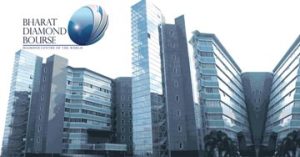
India has once again proved its commitment towards clean and transparent diamond business by enforcing a ban recently on trading of synthetic or lab-grown diamonds within the premises of Mumbai based Bharat Diamond Bourse (BDB). Henceforth, all traders will deal only in natural diamonds and strict action would be taken against those who are caught with synthetic diamonds.
Mr. Anoop Mehta, President of the BDB says, “A circular has been issued to all the office holders of the bourse to strictly observe the ban. A strict vigil will be maintained to ensure that no synthetic diamond enters the bourse from now. Moreover, it (the synthetics deal) was tarnishing the image of Indian diamond industry globally. With this we have sent a message to the world bourses that we are dealing in natural diamonds only.”
Thus BDB has now become the second bourse in the world to ban the synthetic diamonds trading. Earlier last year, the Israel Diamond Exchange (IDE) was the first to officially ban trading of synthetic diamond. IDE is also the first exchange to ban trade in conflict diamonds. The global image of Indian diamond industry has been battered during last one-and-a-half-year after many revelations were made on the detection of undisclosed mixing of synthetic diamonds with natural diamond parcels. Even gemological laboratories world-wide had raised an alarm on the unauthorized mixing of synthetic stones, found from the parcels sent from Mumbai and Surat.
Industry sources say that the action was a timely taken measure as the erection of a Special Notified Zone (SNZ) for conducting global rough trading is nearly complete in the BDB where mining giants like De Beers, Alrosa, Rio Tinto etc. are eager to start auctions from November, 2015. According to an official estimate, India which was importing synthetic diamonds worth USD 4 million in 2004-05 had imported the lab-grown diamonds worth USD 86 million in 2013-14, which is 21-times increase in 10 years. So it had become necessary to put a strict vigil on the speedily increasing inflow of such diamonds and to create a congenial atmosphere within the premises of the BDB for transparent global trading.
Moreover, at the request of some Indian processing companies, De Beers plans to set up a synthetic diamond detection centre either in Surat or in BDB, Mumbai soon that will detect diamonds even studded on jewellery. Recently in March, De Beers had set up a grading and inscription facility in Surat, at an investment of Rs 60 crore. Of course, there are some synthetic diamond-detecting machines at BDB but none of them can identify synthetic diamonds in ornaments. The BDB machines have a long waiting list for testing. Other mining companies like Alrosa and Rio Tinto are also expected to start the same facility in India soon.
Mr. Dinesh Navadia, Regional Chairman of India’s Gem and Jewellery Export Promotion Council (GJEPC) says, “Diamond trade of about USD 23 billion is done within the bourse annually. So we want to build a clean image of India’s diamond industry and this is the beginning.”
Mr. Alex Popov, President of Moscow Diamond Bourse (MDB) says, “I believe that the reported mixing of synthetic diamonds with natural ones is scandalous if not plainly criminal. Since this is done mostly with small goods, it is obvious that the focus has been on reported incidents in India and I am encouraged by the unequivocal condemnation that I have heard from our counterparts in India. Of course, all bourses need to take the measures needed to stamp out these practices.”
Industry circles here feel that this is an aptly taken decision by the BDB as it would bear a major impact on enhancing the deteriorated consumer-confidence to a great extent.



